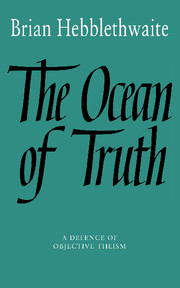Book contents
- Frontmatter
- Contents
- Preface
- 1 Christian belief in God
- 2 The ebbing of theistic faith
- 3 The interiorisation of faith
- 4 Theism in the modern world
- 5 The significance of Kant
- 6 The grounds of theistic belief
- 7 The question of truth
- 8 Religions – theistic and non-theistic
- 9 Life after death
- 10 The Christian Church and objective theism
- Appendix: The Church's ministry
- Notes
- Select bibliography
- Index
8 - Religions – theistic and non-theistic
Published online by Cambridge University Press: 06 July 2010
- Frontmatter
- Contents
- Preface
- 1 Christian belief in God
- 2 The ebbing of theistic faith
- 3 The interiorisation of faith
- 4 Theism in the modern world
- 5 The significance of Kant
- 6 The grounds of theistic belief
- 7 The question of truth
- 8 Religions – theistic and non-theistic
- 9 Life after death
- 10 The Christian Church and objective theism
- Appendix: The Church's ministry
- Notes
- Select bibliography
- Index
Summary
One of the major developments in Christian theology in the modern world has been brought about by our increasing knowledge of and contact with other religions. Acquaintance with the scriptures and traditions of other faiths and, even more, acquaintance with the faith and spirituality of men and women of other faiths, have made it increasingly difficult for Christians, including Christian theologians, to assert, without qualms, the exclusive claims of Christianity or its status as the culmination of the history of religions. It is not easy to maintain even the finality of Christ in the context of a plurality of developed world religions. One of the effects of the phenomenological study of the religions of mankind (that is, the uncommitted, objective, though empathetic study of religion) has undoubtedly been to increase the pressure towards a relativistic understanding of religion and the religions.
The Second Vatican Council reflected something of these rational and moral pressures in its positive evaluation of the ethics, spirituality and theism of many great world faiths, although, understandably and perhaps rightly, it did not question traditional Christian belief in the finality of Christ. At the end of this chapter we shall consider how it might be possible to hold on to the finality of Christ and at the same time to give due recognition to the religious worth of other faiths.
But the main issue to be tackled here stems not so much from the challenge to uniqueness and finality which Christianity must face in the light of the phenomenology of religion, but rather from the even more radical suggestion that religious pluralism is indicative of the non-cognitive, or non-fact-asserting status of religious faith.
- Type
- Chapter
- Information
- The Ocean of TruthA Defence of Objective Theism, pp. 114 - 125Publisher: Cambridge University PressPrint publication year: 1988



